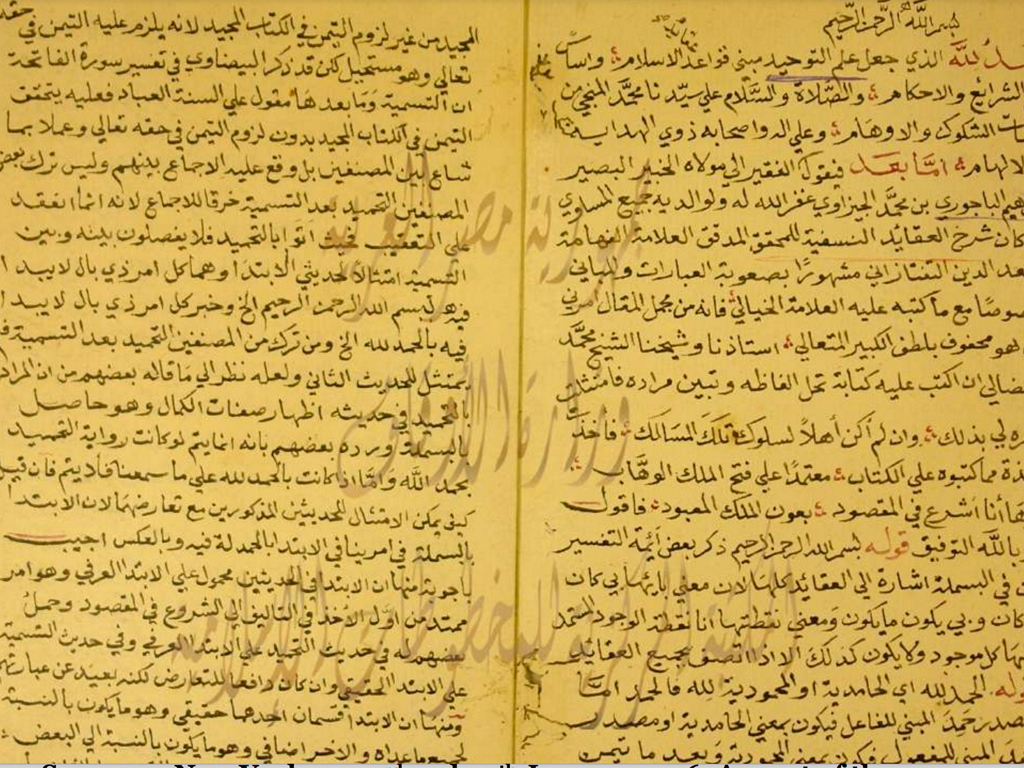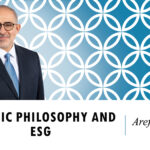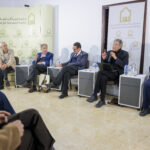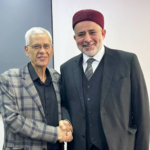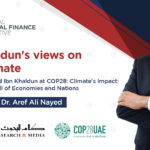Kalam Research and Media (KRM) in partnership with the John Templeton Foundation sponsored the Digital Hawashi workshop in Syracuse, New York on 23rd and 24th January 2016. As part of the Islamic Analytic Theology initiative, KRM is developing a major theological online portal, Riwaq, which will be launched very soon, and one key component of the Riwaq portal is the Digital Hawashi platform which will aim, through the digitization of classical texts and interlinear commentary from classical and modern theologians to revive the study of key theological texts.
The Digital Hawashi platform will be presenting the Creed of Nasafi and Taftazani’s commentary in digital form and overlay on to the texts some of the leading classical hashiya commentaries. The system will also allow for contemporary discussions and additional comments to be made on the text. It is hoped that contemporary commentaries will arise from this interaction and to then extend this platform to other key Kalam texts in the future. The Digital Hawashi project is part of a number of projects initiated by Kalam Research and Media dedicated to the renewal and revival of Kalam theology.
In order to develop the Digital Hawashi pilot platform, KRM organized a workshop at Syracuse to engage with various scholars. The workshop introduced Digital Hawashi, a new web platform that presents a classical theological text along with its commentaries in a form that allows users to read and annotate the text collectively or privately. Additionally, workshop participants led discussions on topics relevant to the site’s core text, with an aim towards beginning conversations that would continue throughout the year via the Digital Hawashi website’s annotation function, followed by future workshops.
In its first stages, the Digital Hawashi website presents al-Taftazani’s popular commentary on al-Nasafi’s short creedal statement (al-‘Aqa’id al-Nasafiya). In addition to these two core texts, three super-commentaries (hawashi) were also typeset and added to the site, so that readers can read relevant portions of al-Taftazani’s text, followed by the super-commentaries. The three super-commentaries on al-Taftazani’s commentary that are included on the site are those of al-Khayali, al-Siyulkulti, and the little known and as of yet unpublished (and unfinished) super-commentary of Ibrahim al-Bajuri.
The website allows readers to annotate portions of the texts, from single words to whole passages, which in turn can receive replies from other users. It is this annotation space connected to the text that distinguishes the Digital Hawashi from other online texts which often only provide traditional comments and replies at the bottom of the page or on a separate discussion board. Utilizing the third-party annotation software Hypothesis, Digital Hawashi will hopefully grow into an online community of scholars and students of Islamic Theology who comment directly on the text and initiate discussions on issues of contemporary relevance.
The organizing principle behind the project is that, in the past, texts such as al-Taftazani’s provided a common platform for scholars to interact across time and space via their super-commentaries on the text. While it took significant time for these super-commentaries to be dispersed and contemplated by other scholars, who might respond with their own super-commentaries, present-day technology permits such discussions to happen in the digital margins of such texts in real time.
Attendees at the conference included Sheikh Omar Qureshi (Loyola Chicago), Dr. Carl Sharif el-Tobgui (Brandeis University), Dr. Ahmad Abdel Meguid (Syracuse University), Dr. Aaron Spevack (Colgate University), Bassem Ghamian, and Seif Seineldin. Others attended Saturday’s afternoon session via Skype. Attendees tested the site, and began discussing potential uses, including collectively producing a critical edition with contemporary commentary, as well as using the private group annotation function on the site as a teaching tool for those teaching the text to a group of students, allowing both students notes and questions, as well as comments and answers from the teacher.
After Dr. Aaron Spevack’s presentation of the site and its capabilities, and an ensuing conversation regarding its uses and opportunities for improvement and expansion, Dr. Carl Sharif el-Tobgui and Sheikh Omar Qureshi led a nuanced and detailed discussion on the competing epistemologies of traditional kalam-theology and post-enlightenment modernity, and the need for a more robust Islamic take on contemporary science and its metaphysics.
Centered around the chapter on the causes of knowledge (asbab al-‘ilm) in al-Taftazani’s text, the various participants addressed the need for a clearly articulated epistemology of certain and probabilistic knowledge in conversation with the competing epistemology of post-enlightenment secular and liberal discourse. The problem of adequate yet flawed theories in science, like competing theories of Arabic grammar, that produce sound results even if the veracity of their premises is flawed or debatable, was discussed, particularly with regard to the problem of scientism in many Muslim communities. In other words, since the arrival of post-enlightenment ideas of rationality and empiricism in many Muslim societies, many Muslims have held up western science as the yardstick of truth and validity, despite the problem of fallibility, especially in the theoretical domain of science, which often leads to shifting truth-claims. While a flawed theory can lead to a working combustion engine, this successful pragmatic dimension of the theory is deeply problematic when it is proven false in the theoretical realm, especially when one has changed or abandoned his or her theology based on disproven theories, that nonetheless have had successful pragmatic uses.
Sunday’s discussions further explored the epistemological concerns discussed on Saturday and also introduced those portions of al-Taftazani’s text that overlap with Islamic Jurisprudence, in particular varying notions of ethics and morals in relation to the Taftazanian epistemological framework. That is to say, al-Taftazani’s discussion of the causes of knowledge mentions the intellect, the senses, and truthful report (in particular from Allah via the Prophet) as avenues of true knowledge; Dr. Ahmad Abdel Meguid stressed the foundationalism of the kalam-theology approach to knowledge entails a necessary and powerful rebuttal of the relativistic hermeneutics of post-modern thinkers like Derrida, opting instead for an authoritative and obtainable interpretation of truthful reports as the ultimate source of ethics and morality. The relativism and ever-shifting claims of post-enlightenment modern thought, which seeks to place the subject of ethics and morality entirely in the domain of the intellect, was further discussed and critiqued by participants.
Furthermore, topics relevant to those chapters that overlap with Islamic jurisprudence also ventured into the proper application of the kalam-based epistemology where, when imagined in a hierarchical tree-chart or mind map, various branches must be put in conversation with both near and distant branches for the proper application of standards of theology, jurisprudence, as well as derived law (fiqh). Regarding this latter point, the importance of putting the ahkam al-taklifiyya—those rulings that declare an action mandatory, recommended, permissible, disliked, or forbidden—and the ahkam al-wad’iyya—those that serve as a condition, preventative, or cause for the ahkam al-taklifiyya to apply—served as a prime example, as mentioned in the works of Sheikh Abdallah Bin Bayyah. It is this subtle yet crucial point that differentiates authentic application of standards of traditional kalam-based epistemology in the realms of theology and law from the inauthentic and dangerous applications of extremist groups today.
The workshop concluded with the agreement of all attendees for the need to continue discussions around the issues in al-Taftazani’s texts in two domains: the first being the necessary conversations in the digital margins provided by the Digital Hawashi website, and the second being the publishing on the web of the results of such conversations in a hierarchical format that provide easily expressible and understandable answers to some of the toughest questions facing Muslim communities today. Towards the latter goal, participants began formulating a method of addressing such pressing issues, which begins with identifying the core question and what is ultimately at stake, followed by historically contextualizing the issue—both from within the western discourse as well as the Muslim discourse—in order to understand why certain issues are so pressing today that were taken for granted in the past. Finally, the next step, as emphasized by Dr. Ahmad Abdel Meguid, the need for a foundationalist approach to the question in order to ground the answer or answers in a sound methodological framework, even if multiple answers may be given due to differing interpretations and rulings.
All participants expressed their interest in continuing their work towards both above-stated ends—producing a critical edition through online interaction on the Digital Hawashi site that addresses both philological and philosophical issues, as well as the hierarchical web resource that grounds, contextualizes, and answers the crucial questions of the day—and agreed for the need to meet multiple times throughout the year after substantial interaction via the website.

